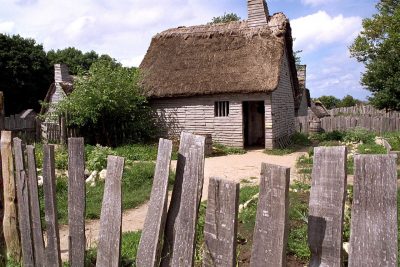Families across the country have altered their Thanksgiving plans, and the birthplace of the holiday is no exception.

Plimoth Patuxet Museums has reduced its dining capacities, implemented one-way pathways and increased cleaning protocols.
Kate Sheehan, associate director of media relations and marketing, said the museum is open and continues to educate visitors about colonial history.
“Our emphasis is on continuing to deliver the powerful personal experiences with history that we always deliver,” Sheehan said, “but within a socially distanced atmosphere.”
The museum will serve less than 700 meals this week for its Thanksgiving dining, down from its usual 3,000, Sheehan said.
Guests can enjoy a traditional 17th-century “New England Harvest Feast” or the “‘Story of Thanksgiving’ Dinner,” which features dishes popular for modern Thanksgiving meals, including cranberry relish and mashed potatoes.
Space is mostly reserved for these meals, Sheehan said, but grab-and-go options will be available in the museum’s cafe.
Most of the museum’s sites are outside, Sheehan said, making it easier to keep visitors safe from COVID-19. The facility has also added hand sanitizing stations and sanitize surfaces frequently.
The museum changed its name from Plimoth Plantation this year to reflect its focus on the Wampanoag Tribe’s experiences in the region, Sheenan said. It aims to educate visitors about Indigenious people’s history before, during and after colonization, including their presence in New England today.
“Telling those stories is something that we do day in and day out,” Sheehan said. “So, really what you find on Thanksgiving Day is no different than any other day at our museum.”
Plimoth Patuxet has also revamped its popular interactive digital game for children to better represent the Wampanoag’s perspective of colonization.
Sheehan said it’s important to understand the “complexity” and “humanity” of both the Native Americans and pilgrims, rather than rushing to judgments.
“We see now how easy it is to ‘cancel’ people and not understand them,” Sheehan said. “To not reduce those histories and those people is really important.”
David Silverman, a history professor at The George Washington University, said the story often told to children of peaceful relations between settlers and Native Americans is “fundamentally untrue.”
“It’s a story of bloodless colonialism,” Silverman said. “It’s a sanitized story of European colonialism, but European colonialism was fundamentally a bloody affair.”
He said the story suggests Native Americans were “passive bystanders” to colonization, despite their violent resistance.
Thanksgiving was not associated with the Plymouth Colony until the 19th century, Silverman said. The first Thanksgiving story allowed white Protestants to claim ownership over the country as more Catholics, Jews and Eastern Orthodox Christians immigrated from Europe.
Silverman said people should “separate the myth from the holiday” and enjoy their time with family without what he said are “inaccurate” historical associations.
John Turner, a history of colonial New England professor at George Mason University, said the harvest festival known as the First Thanksgiving celebrated a bountiful harvest after a challenging winter for the pilgrims.
About 90 Wampanoag men arrived at the feast to investigate the sound of gunshots, possibly from pilgrims having target practice or contest, Turner said. The group then enjoyed the feast over a few days together, he said.
“These were two people who were really very wary of each other and had nevertheless decided to become allies out of a sense of joint necessity,” Turner said. “The English population expanded, basically took the land, killed those who resisted. But, at least for a few days, you had feasting together instead of fighting.”






















































































































